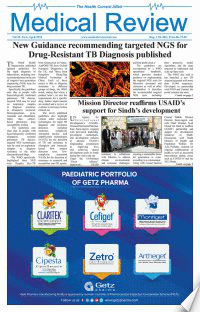Inamullah Khan, Director, Field Operations & LMIS; Dr. Khurram Shahzad, Director IT System, M&E and Training; and Ms. Ambreen Khan, vLMIS Officer of John Snow Inc.; USAID | DELIVER PROJECT
The Second Governance Forum 2015 was held on Thursday, December 31, 2015, at the Quaid-i-Azam Auditorium, Faisal Mosque Campus of the International Islamic University, Islamabad. The event was organized in collaboration with the UNDP, and was attended by top bureaucrats, experts of governance and related areas.
The event was considered as a step forward to create high performance and citizen focused governance. The forum aimed to provide a roundup of government’s achievements in various areas of governance; chalking out a plan of action for high priority reform initiatives for 2016; deliberating on workable citizen-centric governance reform agenda; and providing a platform for various stakeholders to come together and share their experiences for mutual learning/collaboration. The governance forum was chaired by Professor Ahsan Iqbal, Federal Minister for Planning, Development & Reforms.
The event was organized as follow up to the “Consultative Workshop on Government’s Mid-Term Performance Review and Future Planning”, held on 8 December, 2015 at the Planning Commission, Pakistan Secretariat, Islamabad, where leading opinion leaders were invited. Dr. Muhammad Tariq, Country Director of John Snow Incorporated (JSI), was among the few leaders who were formally invited on a special request by the honorable Federal Minister for Planning, Development & Reforms Prof. Ahsan Iqbal to participate in the high level consultative workshop, and later in the Governance Forum held on 31 December, 2015.
Displaying JSI- DELIVER project publications:
During the event, various public and private sector stakeholders were given an opportunity to showcase their last 30 months performance on strengthening governance and accountability in the country. The stakeholders include; civil services, police and criminal justice departments, IT sector, health and education sectors.
On the invite of the Ministry of Planning, Development and Reforms, Government of Pakistan, JSI-DELIVER project also participated in the event and displayed technical assistance (TA) and ICT publications, provided to the federal and provincial governments. A separate display area was specified at prominent place.
The Project, in collaboration with the federal, provincial and regional governments, has developed various logistics and supply chain related policy, standard guidelines and manuals. These manuals include “Essential Medicines Lists” for primary and secondary level health facilities, “Procurement Manual for Medicines and Supplies”, “Contraceptive Procurement Manual”, “Standard Prequalification and Bidding Documents” for national and international procurements “Integrated Contraceptive Logistics Manual”, “MNCH Very Essential Medicines List”, “EPI Logistics Manual” and “Vaccine & Contraceptive LMIS Users’ and Facilitators’ Manuals”. Job descriptions, Health & Safety Manual, Monitoring Checklist and Standard Operating Procedures for the Central Warehouse and Supplies, Karachi and EPI Warehouse Islamabad. The WHO and corresponding procurement regulatory authorities have reviewed and endorsed the Essential Medicines Lists and procurement manuals respectively.
Honorable Minister visited JSI Display Centre:
Federal Minister for Planning, Development & Reforms Prof. Ahsan Iqbal visited the display centre of JSI / DELIVER project. The Director, Field Operations & LMIS briefed the minister about project contribution towards sustainable strengthening public health supply chain management system across the country. He also briefed on how the project supported technical assistance improved governance and accountability around health logistics and supply chain across the country. Minister highly appreciated USAID support to the GoP and project supported TAs and ICT publications.
Large number of event participants visited JSI display centre and were briefed by the project staff on logistics and supply chain interventions in Pakistan and relevant documents. They took keen interest in all manuals and policy documents and appreciated the support.
Web-based Logistics Management Information System (www.lmis.gov.pk):
With the project’s technical and financial support, Pakistan’s first web-based logistics management information system (LMIS) was developed in 2010 in collaboration with the health and population sector of Pakistan and launched on 11 July 2011 by the then Prime Minister of Pakistan. The system currently covers three major health commodities which include vaccine and cold chain equipment, contraceptives and tuberculosis medicines and has the flexibility to expand it for all health commodities. Contraceptive LMIS is implemented in all districts of the country, whereas Vaccine LMIS and TB-LMIS are implemented in 83 and 100 districts of the country respectively. Vaccine LMIS will soon be scaled up to all districts of Pakistan for better coverage. LMIS is a monitoring tool that improves governance and accountability around health logistics and supply chain through data visibility and stocks availability up to health facility level across the country.
Media coverage:
Media representatives, covering the event, from print and electronic media also visited the display centre and were briefed by the project staff about the role of ICT for health logistics and supply chain which improve governance and accountability in the health and population sector of Pakistan.


